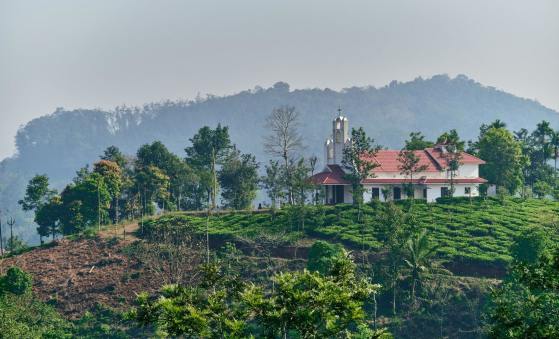
Jewish academic and Hebrew scholar Irene Lancaster reflects on the Exodus of the Israelites and what real freedom is.
We're not out of the woods yet. That is what the children of Israel experience in last week's Torah portion. The 10 plagues are over and done with, but are the people really free? What appears to be the case may turn out to be illusory.
Last week's Torah portion, known in Hebrew as Beshallach (Exodus 13:17-17:16) describes how 'when Pharaoh sends out the Jewish people' G-d guides them through the Wilderness, rather than 'by the way of the land of the Philistines' (on the 'war-torn' west coast), so they are directed instead to the Sea of Reeds.
G-d then ensures that the people are chased by Pharoah's chariots, so that they wheel round, pitching their camp 'before Pi Hachirot', an Egyptian town, renamed in Hebrew 'Gateway to Freedom'. According to the foremost Biblical commentator, Rashi (1040-1105), this spot was the border city of Pitom, the very city where the enslaved children of Israel had laboured for Pharaoh. How ironic that this was the very spot where the people had to make up their minds – to stay, or to go?
This Torah reading of the children of Israel thinking they are free but having to deal with Pharoah's army coincides with the popular Jewish festival of Tu B'Shvat, New Year for Trees. Why should the tale of escape and derring-do have anything to do with the onset of spring in Israel, with the sighting of the first almond, an event so significant for Jews that the very first Knesset (Israeli Parliament) was inaugurated on Tu B'Shvat, and celebrated with the planting of almond trees.
First of all, what is a tree? A tree is a natural phenomenon with splendid branches and blossoms, fully visible to the outside world. But what keeps the tree alive? Sustainable roots hidden underground.
The hidden roots are essential to the well-being of the whole; without the roots, the tree withers and dies. This is the link. At surface level, the people may think they are free, but unless the people are firmly rooted, just like the tree they will wither and die. This is the lesson imparted by both the Torah reading and by the festival of Tu B'Shvat.
Last week, on the eve of Tu B'Shvat, a Parliamentary committee in London met to discuss a Hybrid Bill. This Bill was concerned with the building of an intrusive and ungainly construction (ostensibly with a 'Holocaust' theme) in Victoria Tower Gardens, Westminster, thus turning this special green oasis into a Disney-like 'Holocaust' theme park.
Were this ill-thought-out operation to go ahead, not only would it desecrate the Shoah, but would also entail digging underground and destroying a number of much-loved ancient trees which give the park its raison d'etre. During this hearing, therefore, a number of landscape and tree experts explained the importance of retaining trees as an essential part of the park, and noted that digging underground for whatever reason would damage the roots – and to what end?
And 'to what end' is the moral of last week's Torah reading. What is the point of freedom if you can simply then do what you like. If selfishness is your goal, then you might as well return to servitude, instead of using this freedom in order to enhance life. Just as a number of witnesses demonstrated last week that the old ways of commemorating the Holocaust (including the erection of giant constructions and imposition of irrelevant teaching methods) are no longer fit for purpose, so, in last week's Torah reading, a new path through the sea must be charted in order for the children of Israel to carry on surviving in a hostile world.
Beshallach therefore charts the ups and down, the one step forward and two steps back mentality of the people who are now wending their way laboriously through the desert for 40 years. Because the main thing is to look after the roots, and then the branches and blossoms will look after themselves.
But, how do the people actually feel when they realize they have to cross the Reed Sea, with Pharoah's chariots chasing behind them. How can the weak and vulnerable slaves deal with the powerful who want to draw them back into their own sphere, into the old ways of thinking, no longer fit for purpose?
G-d knows this and therefore performs a miracle by splitting the sea. But the people, still tied to their slavish mentality, don't understand this miracle until they themselves take the plunge. Did they know that they were part of a miracle? Anyone who has swum in uncalm seas knows the feeling of having to deal with the waves, or else go under. But the children of Israel learn to take a leap of faith, and it is when they take that leap of faith that the miracle unfolds before them.
That's what we felt like last week, when a path appeared in Parliamentary proceedings and a way out of the 'Sea of Reeds' was forged by tree experts and four Holocaust survivors alike, who told their stories and let rip. They let rip against the philosophy which is holding us back. We experienced perhaps the first glimpse of a possibility of real freedom in the Promised Land, celebrating not the death, but the living creativity of the Jewish community .
The ancient Egyptians celebrated death – that is what the pyramids are for – while Jews celebrate life. Life is a garden that must be nurtured. Trees are of overwhelming importance in Judaism – tree planting was essential to building up the new Jewish State, and Tu B'Shvat is a true celebration of new budding life and the possibilities this new life entails. As long as the tree is firmly rooted in the ground, new blossoms may appear. But destroy the roots and the will to live is eradicated – maybe for ever.
So the children of Israel sing the Song of the Sea, led first by Moses their leader and then by his sister, Miriam, who had saved him as a baby from the death edict of Pharaoh. 'Sing to the Lord for He is exalted above the arrogant, having hurled horse with its rider into the sea.'
Who are the arrogant in our own day? It is perhaps unwise to speculate. However, we learn from this seminal passage that being part of a bandwagon isn't always a good idea. And who knows, maybe once we take the plunge, life will open up in ways unimaginable.
Republished from Christian Today UK.




